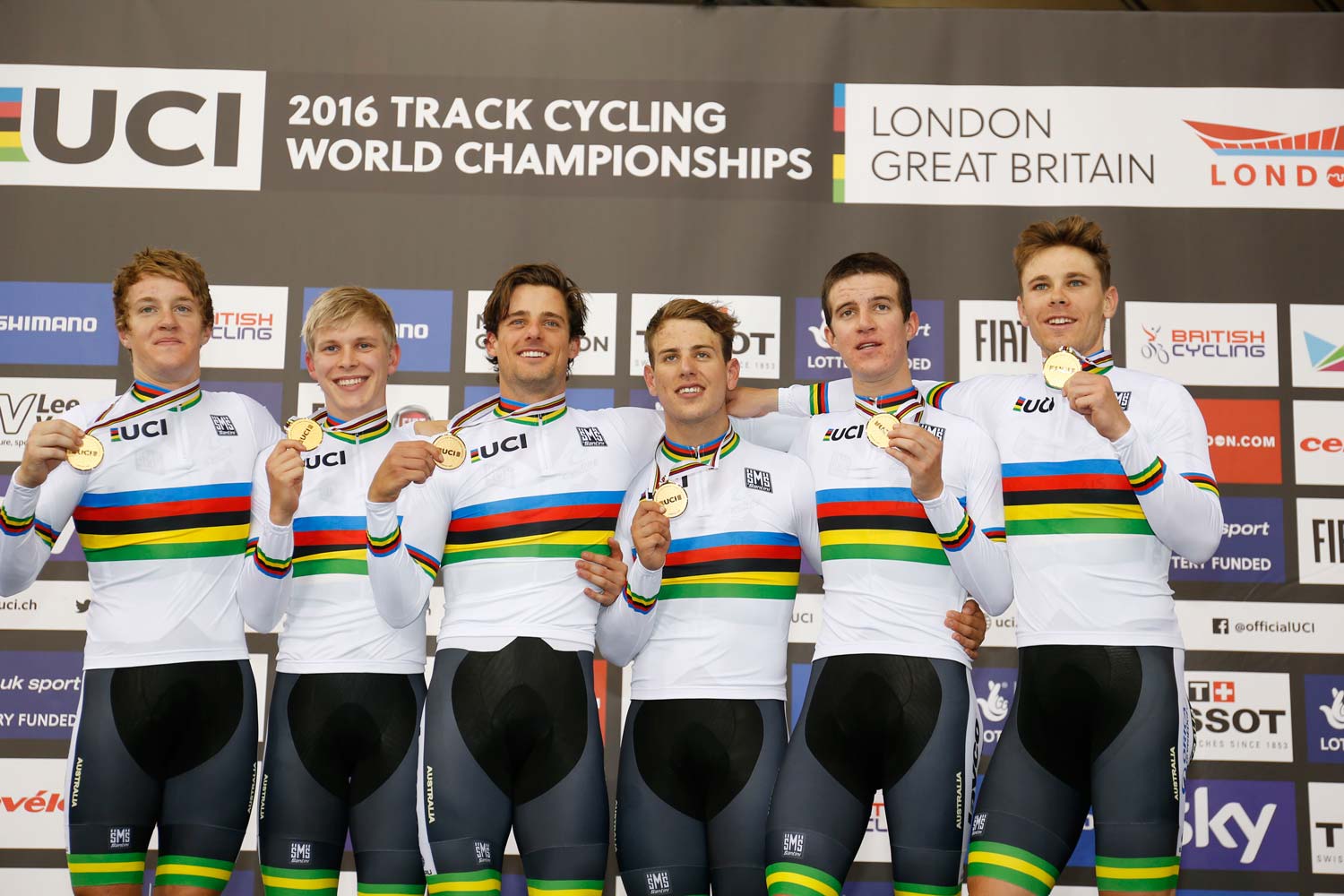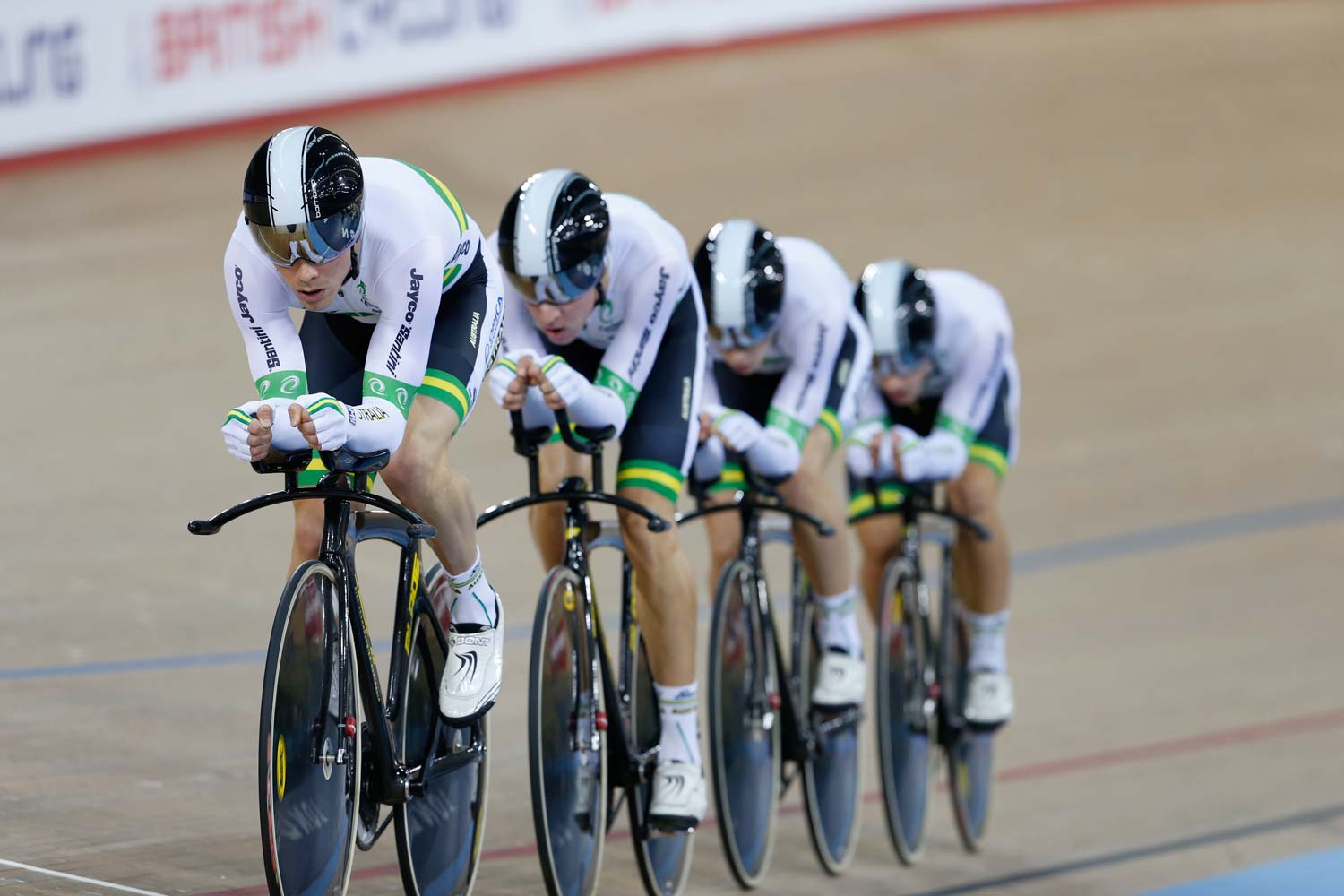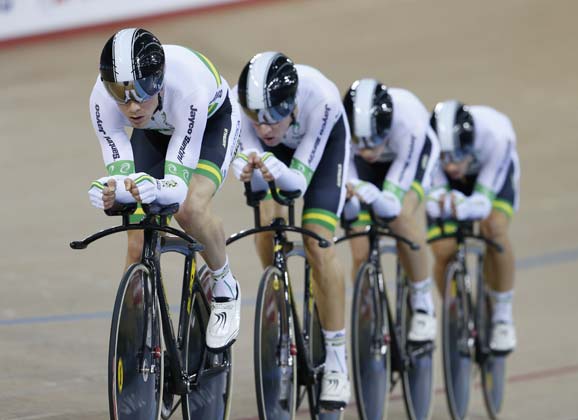One of the most beautiful of all the cycling disciplines is the team pursuit. Precision, power, poise and sheer determination all on display and the collective all benefitting from cohesion.
The Australian team has a remarkable record in this event, winning the gold medal at 11 of the past 23 world championships.
Overnight in London four young riders posted the fastest time ever ridden by an Australian team in this 4,000m event: 3:52.727!
To try and put the achievements of Luke Davison (25), Michael Hepburn (25), Alex Porter (19), Callum Scotson (19), Miles Scotson (22) and Sam Welsford (20) into perspective, we spoke with former world and Olympic champion Brad McGee to get his thoughts on a remarkable ride by an amazing group of young Australians…

From left to right, the 2016 team pursuit world champions: Callum Scotson, Alex Porter, Luke Davison, Sam Welsford, Miles Scotson and Michael Hepburn.
Photo: Yuzuru Sunada
Below is RIDE’s interview with Brad McGee about the gold medal ride in the 2016 world championships team pursuit…
RIDE: I’m talking to Brad McGee after a remarkable three minutes and 52 and a bit seconds of racing overnight in London. You’ve ridden a world record or two in your time, what did you make of what you saw the guys do at the world championships?
Brad McGee: “What we saw was the age-old competition between Great Britain and Australia but at speeds I don’t think we’ve seen for a long time, not so close in competition. It was a very high level of performance.
“What was interesting is that it was like an old street fight with [Bradley] Wiggins doing a big ‘ball-biter’ – as he used to call it – to bring them back into the game and Australia doing a peel with young Callum Scotson swinging in the middle of the straight… it was a real old scrap – but at warp speed.
“It was something we’ve never really witnessed before.”
It was a super fast start and the Aussies led for 12 of the 16 laps. Did you think, when Wiggins came through at the end, that was the end of it?
“Oh, I never doubted Australia. If you look at the composure the four of them had throughout the entire [final] really, compared to a little bit of scrappiness from the Brits…
“I was very surprised the Brits came back into it at all but of course that’s the influence of Bradley Wiggins and his ability.
“In the end the race went the way you would expect from those opening metres. But Wiggo really did stretch it and gave the Aussies something to think about.
“One of the things to consider is: where is Ed Clancy at? It’s only 12 weeks after back surgery.
“Yes, Australia gets the title but they’re not going to be breathing too easy with the team pursuit squad from here all the way to Rio, that’s for sure.”
There are two 19-year-olds in that line-up of six who got the gold medals (and one who just turned 20). What do you know about Sam Welsford?
“There are no surprises there. What Sam did in those last two laps was pretty inspirational. I’m not saying he won it for Australia because it’s a massive team effort but without Sam it could have been touch and go if the Aussies finished the job. It was really amazing.
“That’s something we’ve seen in Sam for a long time. He’s noted as a very quick, powerful rider. He’s a ‘kilo’ rider with a very fast flying lap.
“He has really worked on the areas which challenge him – that is the individual pursuit – and that helped him win the Australian pursuit title this year in front of Michael Hepburn.
“It’s just great to see a young fella like that putting the total package together.”

You were there in Athens [at the Olympics in 2004] when you set a world record in the semi final. You know what it’s like to go fast but can you conjure going 3:52?
“I remember at the time, and it was an outdoor track in Athens, that we were going at speeds that no one had ever gone before – obviously, it was a world record. But we did, amongst the group, sort of pose the question: can we go faster?
“I guess it comes down to necessity. And, yes: they will have to go faster. So forget about the contemplation of ‘can we’, ‘should we’, ‘would we’ – you just have to. And there’s no doubt the Brits will be going quicker.
“They are within a second of the world record (3:51.659) so, without doubt, in Rio they’re going to have to break the world record.”
You know these guys and you know the gears they’re riding. What would they have had for the London right last night?
“I they’re up around 110-112 – maybe even practicing with higher gears.
“What’s amazing there is that the younger riders in particular, the 19-year-olds [the starter, Callum Scotson, and Alex Porter] are managing to move such big gears.
“Once you’re up and running of course the revs are still quite high but it’s just getting that gear off the mark and the high power that’s required. It’s hard and it takes years to develop but of course now we’re seeing young riders fast-tracked through to the top end of the competition pretty quickly.”
We got to see a fair bit of [British endurance coach] Heiko Salzwedel on the other side of the track. Did you watch his body language?
“Yeah, I’ve watched and rewatched that ride about 100 times I think! Specifically him? Well, it was interesting to see what his reactions were to get some sort of measure: what does that mean for where is expectations were for their performance? And I think he was a little bit rattled.
“Of course, in the heat of the battle, there’s not just the athletes going through that level of anxiety.
“He wasn’t calm and he wasn’t composed – much the same as what it seemed like the athletes from Great Britain, in my view, were showing.
“But that means zero when it comes to preparing for Rio from here.
“It’s just going to be a great continuum of this battle between Britain and Australia.”
And a fine reminder of how beautiful a team pursuit is…
“Oh absolutely! I mean the speeds they’re travelling now is just mind-blowing. To do it all within millimetres of each other just shows the level of synchronisation they’ve got.
“What’s even more amazing is that with the Aussies the depth of talent that the team has got to put together. They used six riders there to get that gold medal and I know for a fact, sitting here at the NSW Institute of Sport, that there are other riders who only narrowly missed the cut. In any other year they could have been there as well.
“It’s a good and a difficult problem for Tim Decker, the national coach, to have. But right now they can certainly enjoy the next little bit – the next couple of days maybe – before they get back to the grindstone and start looking at Rio.”
– Interview by Rob Arnold



